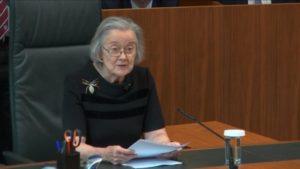Back in June, Lord Sumption delivered the Reith Lectures on BBC Radio 4. In a series of devastating talks, he charted “law’s expanding empire” – the extension of the law into areas of public life that were previously thought of as being beyond its legitimate remit.
Human rights law, he argued, has been particularly beset by a sense of mission creep.
When he delivered his lectures, he could hardly have imagined how prescient his words would seem just a few months later. The philosophical question raised by Gina Miller’s recent use of the law to thwart the will of the executive in proroguing Parliament was very much a question of the proper balance between the political and the legal. As Sumption warned, the encroachments of law into areas that it previously thought of as outside its concern threatens fundamentally change the balance of our constitutional settlement.
 With this in mind, I had high hopes for a lecture given last week by Lady Hale, president of the Supreme Court, which promises to address the issues that Sumption raised. “Law and Politics: A Reply to Reith” is the title. How exciting, I thought, as I began to read. This is going to be important.
With this in mind, I had high hopes for a lecture given last week by Lady Hale, president of the Supreme Court, which promises to address the issues that Sumption raised. “Law and Politics: A Reply to Reith” is the title. How exciting, I thought, as I began to read. This is going to be important.
After all, it was Lady Hale that presided over the decision to uphold Miller’s complaint against the government’s decision to prorogue. So what better person to defend or deny “law’s expanding empire”.
But she doesn’t really do any of that. Hale breaks down Sumption’s argument into a series of case studies, and seeks to address his point in terms of each specific case. It’s a very effective way of defusing the charge, talking all the energy out of Sumption’s challenge by breaking it down and down until the big picture problem is thoroughly obscured. Only at the end does she begin to grapple with some of Sumption’s point, in a tone of fully self-confident reasonableness.
The task of any modern Constitution is to keep these processes in balance. But in our Constitution the fundamental principle is Parliamentary sovereignty, which both the executive and the courts must respect. We in the courts will always ultimately do Parliament’s bidding. Forgive me if I don’t quite understand what the problem is with that.
Who could disagree?
Well, here’s the problem. Hale’s sneaky use of the term ‘balance’ to set the law against “political processes” that can be used to promote what she calls “oppressive or discriminatory” values, ends up giving certain values a kind of privileged status within the constitution. And who gets do decide what counts as “oppressive or discriminatory values?
“I believe in the same liberal values as you do” Sumption replied to Helena Kennedy in Prospect magazine: “But I also believe that in a democracy, liberals must take their chances in the political marketplace like anyone else.”
Unfortunately, Hale doesn’t begin to answer this point. And it is a point that really needs answering.








Join the discussion
Join like minded readers that support our journalism by becoming a paid subscriber
To join the discussion in the comments, become a paid subscriber.
Join like minded readers that support our journalism, read unlimited articles and enjoy other subscriber-only benefits.
Subscribe